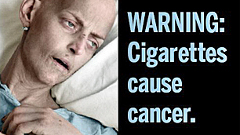There are a lot of things going on in this country that should be issues in this election: Fisheries and Oceans Canada's support for fish farms, the tar sands, and pipelines, to name three. With an annual death toll of 45,000 Canadians, tobacco should be a major topic of discussion, too.
We had a situation just five months ago where Health Canada was scrapping a plan to increase the size of warning labels on cigarettes as a result of lobbying from the tobacco industry. Read about it here: Conservative Federal Government owned by tobacco industry.
As a result of the exposure of the tobacco industry's involvement in this, the Harper Government changed its mind and went ahead with a a policy that was under development for six years. This is a old problem, however. Not long ago, it was common for tobacco industry spokespeople to say that the tobacco industry is a "partner" with Federal and provincial goverments, as part of complaining about taxation of tobacco. This is silly nonsense; automobiles, for example, are taxed heavily, but you don't hear auto industry lobbyists using language like this.
The Harper Government certainly didn't invent the idea that the tobacco industry is a "stakeholder" on tobacco industry issues; when Paul Martin was Prime Minister, the tobacco industry was much more than a stakeholder. The "stakeholder" idea is one that should be discarded. If you're asked by anyone during the few days left until the election to vote for a certain candidate, this would be a good topic to bring up.
One of the pillars of the Conservative campaign is "tough on crime"; longer prison sentences, building more prisons, that sort of thing. The Harper Government has also talked about the crime of tobacco smuggling, but they quietly adopted a policy of of prison sentences only for repeat offenders. In other words, the Harper Government is "tough on crime" except when it involves tobacco. Again, a good question to ask Conservative candidates about.


